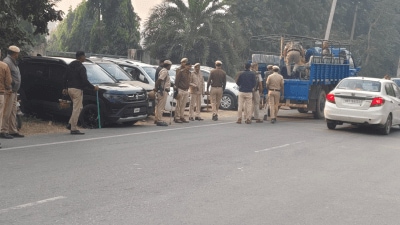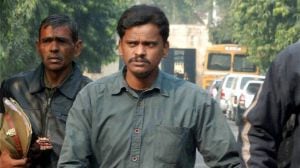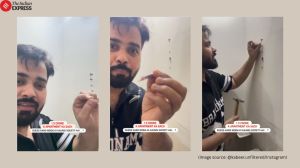Click here to follow Screen Digital on YouTube and stay updated with the latest from the world of cinema.
‘There are invisible glass ceilings that one needs to keep shattering’: Huma Qureshi on playing a cop in Bayaan
The actor and producer talks about balancing mainstream and meaningful cinema and her desire to tell stories that resonate with audience beyond urban centres
 Huma Qureshi talks about her film Bayaan.
Huma Qureshi talks about her film Bayaan.Actor Huma Qureshi is heading to the Toronto International Film Festival (TIFF) with her film Bayaan, which will have its world premiere in the Discovery category. Qureshi, who is currently awaiting the release of Jolly LLB 3 on September 19, is also associated with multiple projects such as Delhi Crime 3, Toxic and Maharani Season 4. She has also set up her own production house Saleem Siblings with her brother, actor Saqib Saleem, and is headlining its first film, Baby Do Die Do.
Qureshi talks about why she was drawn to essaying the character of Roohi in Bayaan, which explores a cop’s journey to investigate the sexual harassment cases at an ashram and her fight for justice. Excerpts:
Bayaan’s writer-director Bikas Ranjan Mishra said that you believed in the story from the moment he narrated it.
I thought the script was fantastic. I had met Bikas in 2019 at an event when I was shooting for Zack Snyder’s Army of the Dead in the US. He was part of a residency programme there. Some years later, he met me and said that he has a script for me. He and (producer) Shiladitya Bora sent me the script. When I read it, I fell in love with their world. I had never played a cop before. What I liked about it was that the story is hyperlocal and set in India but has a global lens. As a performer, I am fascinated with stories like that. It shows that we, as a country, face a lot of challenges but the solution will also emerge from within. The protagonist is part of the system yet manages to bring justice.
You often play female characters with agency. Do the characters choose you or do you choose them?
It’s a bit of both. As an artiste, you always yearn for meatier roles as well as interesting collaborations with directors and writers. The most frustrating thing is to go to work and not be happy about it. I want to come back from a day’s work and feel that I did something meaningful. But, some scripts like Bayaan, also seek me out.
Jolly LLB 3 is going to release soon. How do you maintain this balance of doing mainstream and meaningful films?
I love the fact that popular cinema has a certain reach and that gives the power to do so much more. At the same time, I crave for more layered and nuanced characters to portray. Some of them, I do believe, last the test of time irrespective of their box-office numbers. A friend recently called me and said she watched Tarla on flight. She could not believe my transformation. I am blessed that I get these opportunities — not everyone gets to play the lead in a series like Maharani and feature in a song like Dil thaam ke (Maalik) in the same year. We should not put actors in a box.
Do you believe the industry today is offering more choices to female actors than before?
One can always blame the circumstances and regressive mindset which do exist. However, I believe you have to decide what makes you happy. You have to be brave enough to make those choices. There will be several voices around you but you have to pick what you want. Once during an interview, I was asked why I chose to play Tarla at the peak of my career. But today we have actors like Vicky Kaushal who are doing films that are hyper mainstream as well as nuanced. Why can’t female actors make similar choices? It is an uphill task but it’s a task that I am choosing.
You play a Delhi-based cop in Bayaan. Since you are a Delhi girl, was it easier to prepare for it?
Though I would like to believe I am aware as a person, Roohi is not conscious of her privileges. She takes them for granted. Through her journey, we see this urban girl, who is expected to carry forward her father’s legacy. However, when thrust into a certain situation, she starts re-evaluating her values and privileges. This was fascinating to explore.
How has Maharani, whose Season 4 is coming up, helped you delve deeper into a particular character?
The series is a gift that keeps giving. This role changed my life. When I die, right at the top of my tombstone it will be written: ‘Here lies Maharani’. After seeing Maharani, directors and producers have offered me several challenging parts. The first shot of Maharani was taken in a remote place in Madhya Pradesh. I was sitting on a chatai and grounding spices. It is unbelievable that the character has had such a journey and it is one of the most loved shows of India. We just had a London schedule for Maharani.
You are producing Baby Do Die Do with your brother Saqib.
I deeply enjoy collaborating with my brother, who is a co-resident at my home and now a partner-in-crime. We have this amazing relationship where we complement each other. I identified the potential in Baby Do Die Do and took it to Saqib. He got very involved. He got the director on board and a team of writers. He was clear that we should release it in theatres. I wondered if I was big enough to open solo. But he stuck to the idea. We both are filmy kids. We grew up loving movies and wanting to be part of this world. After we got the opportunity to act in movies, now we are producing. I always wanted to find stories that would resonate with the audience beyond urban centres.
Did you have doubts regarding headlining a theatrical release?
No, but it is a big responsibility. If my film does well, it also opens doors for other woman-centric films. We live in an ecosystem where few female forward films are being made. We have to fight constantly to find the same budget that is easily available for a male actor of similar stature and success. There are invisible glass ceilings that one needs to keep shattering as we go along.



- 01
- 02
- 03
- 04
- 05





























